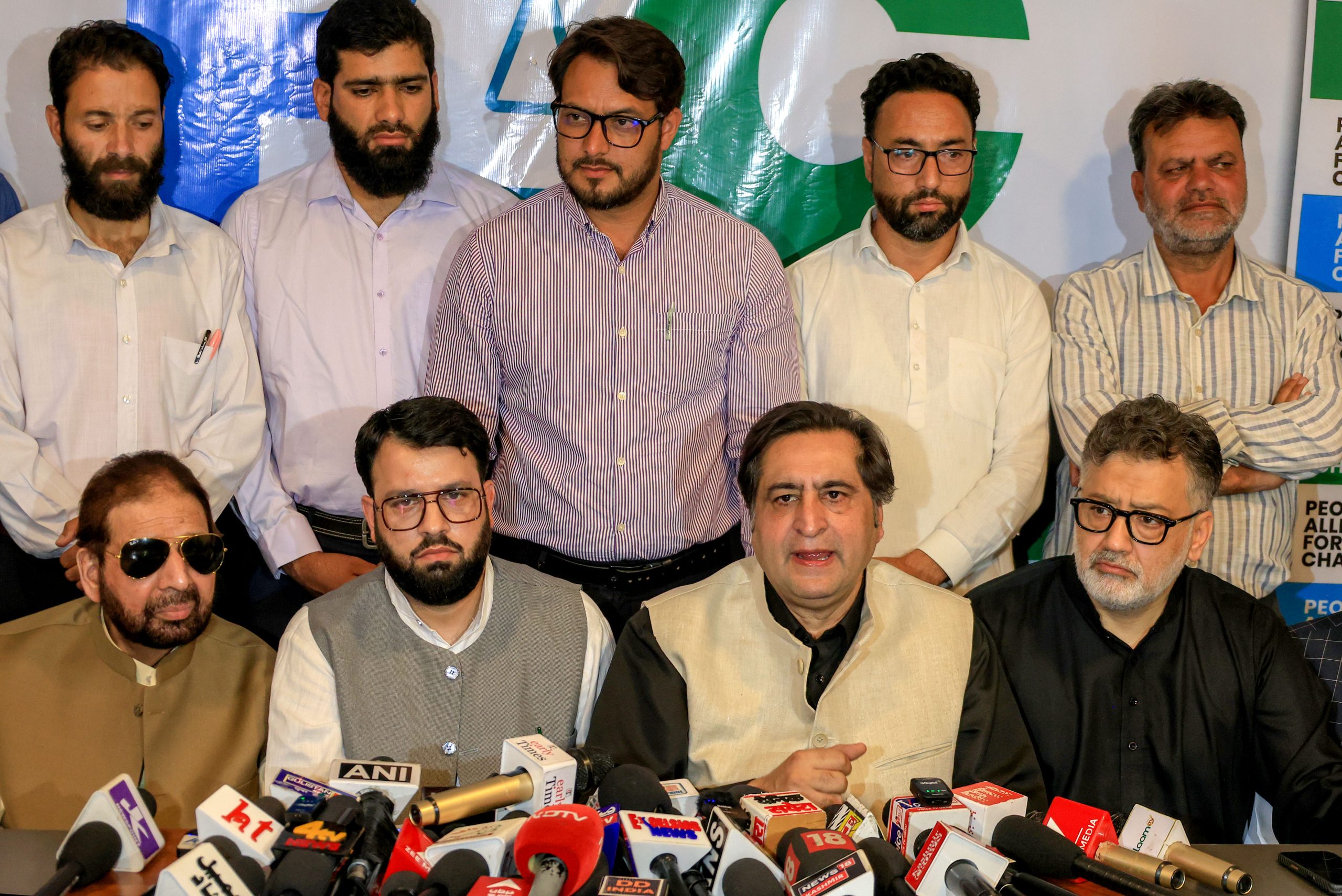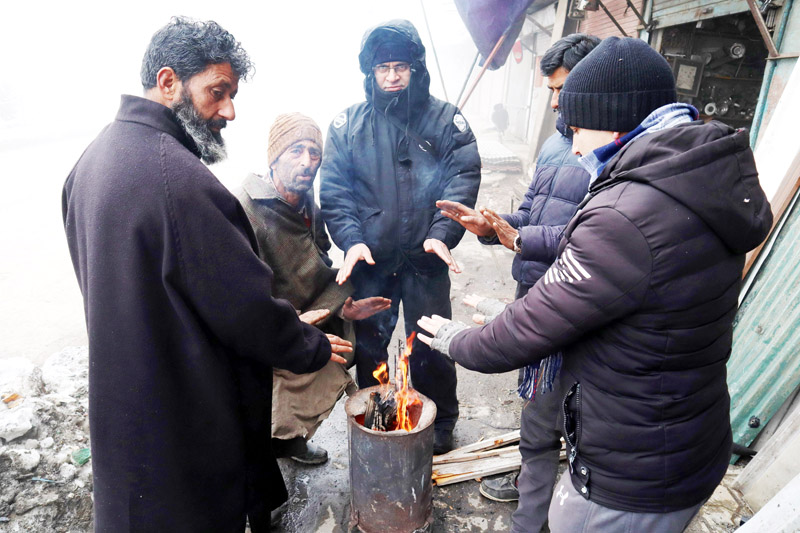People’s Alliance for Change: A New Dawn in Jammu & Kashmir Politics
By: Javid Amin | Srinagar | 30 June 2025
In a dramatic shift in Jammu & Kashmir’s political landscape, three significant political outfits—the Jammu & Kashmir Peoples Conference (JKPC), Justice & Development Front (JDF), and People’s Democratic Front (PDF)—have announced the formation of a unified bloc named the People’s Alliance for Change (PAC). This coalition has vowed to challenge the dominance of the National Conference (NC)-led alliance and push for restoration of the region’s constitutional status prior to the abrogation of Article 370 on August 5, 2019.
Led by seasoned leaders like Sajad Lone, PAC seeks to provide a voice to what they describe as “marginalized and betrayed populations,” aiming to inject new energy into a political environment long dominated by dynasty-led narratives and monopolized discourse.
Why the People’s Alliance for Change Was Formed
1. Disillusionment With Status Quo
PAC leaders argue that the mainstream leadership has failed the people of Jammu & Kashmir, especially during pivotal moments such as the abrogation of Article 370 and 35A. Their claim: NC and PDP leaders did not resign or protest effectively during one of the most significant constitutional rollbacks in India’s post-independence history.
2. Statehood is Not Enough
While many parties, including the BJP and NC, talk of restoring statehood, the PAC insists on restoring the original constitutional relationship between Jammu & Kashmir and the Union of India.
“Our fight is not just for administrative autonomy. It’s for political and constitutional dignity,” said Sajad Lone at the press conference announcing the alliance.
3. Voice for the Marginalized and Misrepresented
The PAC seeks to become a platform for regions and people left behind, offering political space for groups and individuals disillusioned with traditional party structures. That includes former Jamaat-e-Islami affiliates, many of whom were previously barred from active politics.
The Players Behind PAC
Sajad Lone – JKPC
Once a minister in the erstwhile J&K government, Lone has reinvented himself as a voice for merit, youth, and constitutional justice. He has been vocal about the need to move away from traditional politics based on privilege.
Justice & Development Front (JDF)
Backed by former members of Jamaat-e-Islami, the JDF’s inclusion in the alliance is politically significant. It marks the re-entry of banned ideological voices into mainstream democratic discourse.
People’s Democratic Front (PDF)
Focused on social development, the PDF has long advocated for grassroots empowerment, making them a natural fit for an alliance that promises change from the ground up.
What the Alliance Wants: Goals and Demands
Full Restoration of Constitutional Guarantees
PAC is explicit in its demand: reverse the August 5, 2019 decision. They claim the decision destroyed J&K’s constitutional identity and rendered its people “second-class citizens”.
Fair Reservation Policy
PAC has strongly opposed what it calls a regional bias in recruitment and education. Lone recently pointed out that in a recent recruitment list of 26 Junior Assistants, only 5 were from Kashmir.
“This is not a statistical accident. This is a pattern. And this pattern is exclusionary,” he said.
Youth-Centric Development
With thousands of educated youth struggling for employment, PAC promises skill development programs, local job reservations, and protection against exploitative immigration scams.
Reintegration of Marginalized Political Voices
From Jamaat-backed scholars to civil society actors, PAC plans to open its doors to all who have been historically sidelined in Jammu & Kashmir’s mainstream political theatre.
Breaking the Hegemony: PAC vs NC-led Alliance
PAC is being seen as a direct challenge to the NC-Congress-PDP axis, often accused of political monopoly and failure to evolve.
Critics of the NC-led alliance argue:
- They didn’t resign when Article 370 was abrogated.
- They haven’t passed a single resolution in the new Assembly demanding restoration.
- Their silence has enabled BJP’s narrative dominance.
PAC offers a grassroots alternative that doesn’t rely on dynastic appeal but lived experience, credibility, and constitutional clarity.
Reservation Controversy and the Kashmir Disparity
A growing grievance in the Valley centers on regional disparity in reservation policies. PAC leaders claim that excessive reservations for certain groups, combined with the absence of divisional-based reservation quotas, have severely reduced Kashmiri students’ and candidates’ representation.
Civil society inputs suggest:
- Kashmiris are getting pushed out of merit lists.
- There is a perception of ethnic cleansing in recruitment.
- Lack of representation leads to alienation and unrest.
PAC has promised to:
- Push for divisional-based reservation frameworks.
- Advocate for merit-based inclusion.
- Ensure transparency and audits of recruitment processes.
Public Reactions: Will This Alliance Reshape 2025?
Initial public sentiment, especially among youth and first-time voters, appears cautiously optimistic.
“We’re tired of the same faces making the same promises,” said Aamina, a university student from Srinagar. “PAC may not be perfect, but it speaks our language.”
Others are watching closely to see:
- If PAC can hold its ground against NC’s legacy machinery.
- Whether it can deliver policy substance, not just electoral promises.
Implications for Jammu & Kashmir Assembly Elections
As the J&K Assembly elections near, PAC’s formation could fracture vote banks, introduce new narratives, and revitalize civic engagement.
Key questions ahead:
- Will other parties like Apni Party or Awami Ittehad join PAC?
- Can PAC navigate alliance politics without collapsing under ideological differences?
- Will the alliance trigger a national debate on constitutional rights for J&K?
Bottom-Line: A New Chapter, or Just a New Front?
Whether PAC will become a genuine movement or just another short-lived political alignment remains to be seen. But one thing is clear: it has already disrupted the status quo.
By refusing to settle for statehood alone, by calling out biased reservation systems, and by offering a platform to the long-sidelined, the People’s Alliance for Change has tapped into a yearning for dignity, justice, and representation.
The youth are watching. The nation is watching. The elections will reveal the rest.



